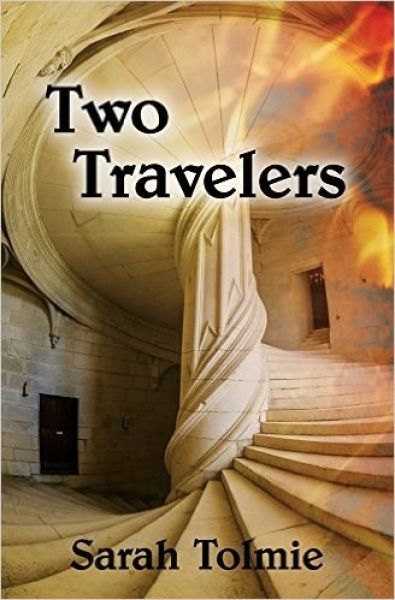My Guide the Morning Star
Two Travelers
By Sarah Tolmie

13 Jan, 2017
A Year of Waterloo Region Speculative Fiction
0 comments
Sarah Tolmie is an Associate Professor of English at the University of Waterloo. Her first spec-fic novel, 2014’s The Stone Boatmen, won a starred review in Publishers Weekly and a glowing blurb from Ursula K. Le Guin. Since The Stone Boatmen, she has published four other books: 2014’s NoFood andSonnet in a Blue Dress and other poems, 2015’s Trio, and the subject of today’s review, a 2016 collection titled Two Travelers.
Two Travelers is a single-author collection containing two short pieces, a novelette (Dancer on the Stairs) and a novella (The Burning Furrow).
A woman wakes and discovers that she is trapped on a staircase, in a strange world whose people observe strict and seemingly inflexible social customs. Customs to which she lacks any clue. It seems that whatever she does is a faux pas. She can escape from her staircase prison if she accumulates enough tokens. She has no tokens and no idea how to get any. Even if she can escape the staircase, is there place for an anomaly like her in a society where everyone has a designated place?
Comments
Although the rules in this alien culture and the physical mechanisms that enforce them are unfamiliar, they are not arbitrary or inconsistent: there is an underlying logic, even if it is a strange one. Reading this back-to-back with a Le Guin novel, I can see much that is Le Guin-like in Tolmie’s approach to other cultures. It’s not surprising that Le Guin was a fan of Tolmie’s first book.
Dragan the cook is a foreigner of some sort. Mike Donelly guesses that the cook is a Romany or possibly a Bulgarian. Mike has no idea how to deal with Dragan’s customs, or even what they are. But deal he must, as Mike’s son Clive has impregnated Melisma, Dragan’s daughter. This could end badly but … while the two teens are hormone-driven fools, their parents are essentially reasonable people willing to make the best of the situation.
But the problem is that Dragan and his family are neither Romany or even Bulgarian. He is an involuntary sometime visitor from another, very different world. The reasons for his condition are unclear. His family has been dragged along in his wake as he shifts from his original world to ours and back. While he is only a humble cook in this world, Dragan is a hero to his oppressed people at home.
The spell, or sentence of exile, or whatever is enforcing the intermittent effect, will end some day. Soon after that, Dragan and his family will not be able to move between worlds. They will have to make a choice: stay in this world, or return. Dragan feels obligated to return. But his daughter is in love, and his wife would like to stay here. She’s all in favour of antibiotics and not dying in childbirth. What to do?
Comments
For some reason, Publishers Weekly thinks Dragan is a Romany, even though the text clearly states
Dragan is a traveler, but not a gypsy. Romany is not his language.
Dragan may come from another space or time but apparently “our kids are hormone-crazed idiots” is universal.
General comments
Dragan’s homeworld is as magical as the world in The Dancer on the Stair. Dragan and his people just as subject to compulsions they cannot or will not lightly ignore.
But the specifics are very different. Dancer’s world appears artificial, almost claustrophobic, whereas Dragan’s borders on the historical. If not for the magical elements, it could almost be a feudal kingdom of the past.
The culture divide in Dancer is between people from very different worlds. In Furrow, there is some cultural disconnect … but the biggest conflict is between what Dragan wants (or feels he must do) and what his wife wants. Of course, the conflict wouldn’t matter if the author didn’t make us care about the characters.
Tolmie draws on much the same anthropological toolkit for her stories, but with very different results. Results that I find new and refreshing. Her prose remains as strong as it was in her remarkable debut novel.
Two Travelers is available here.
